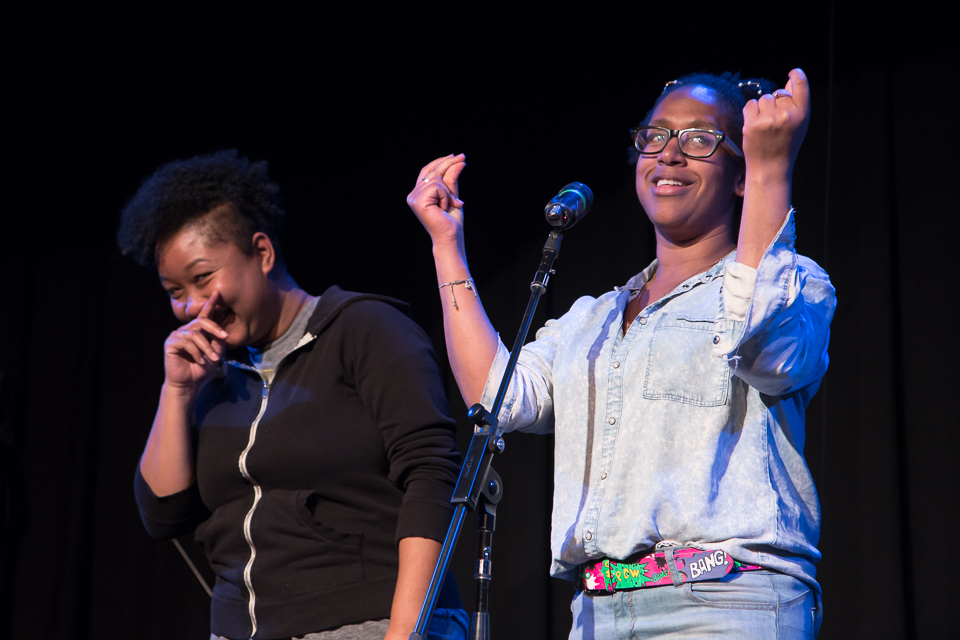Anne-Marie Woods, a.k.a. Amani, first knew she was funny back in grade school when she would be told to stop making funny faces during the Christmas concert. Teachers would send home letters explaining that she was unable to sit still, pay attention and was too talkative.
“Ritalin wasn’t in when I was in school, but they would’ve put me on Ritalin …,” recalls Woods. “But I think creative kids are different, we learn different and we get bored easily … I kinda always just been like this and got in a lot of trouble. Then when I was older I learned to channel it and try to get paid.”
Today, Woods is a multi-dimensional artist — an actor, dancer, singer, poet, producer and arts educator — who has won several accolades, including the 2013 Black Business and Professional Association (BBPA) Harry Jerome Award for Excellence in Entertainment. She is also the producer of the Black Like She, an all-Black, all-women comedy show, which was recently put on during Toronto’s Kuumba festival at the Harbourfront Centre.

Black Like She emulates the passion Woods has in educating people about Black history and women within Black culture. It stems from her brother teaching her about Black history from a young age.
“I think the Black female voice is important,” says Woods. “I think comedy is important because Black women get a bad rap and I know when I see images on television or anywhere it’s always negative and I’m always like well, I don’t act like that. I think using comedy to talk about serious things is such a great way for women to share their stories.”
“I just wanna talk about one thing that for me is really annoying and that’s when white people sometimes they wanna touch our hair … I do my own braids, they’re extensions … when I first started putting braids in, I wasn’t as good as I am now. So y’know they fall out sometimes, especially the ones in the back. It happened to me a few times. One time I was on a date in Atlanta … I went to get out of the car and I noticed that three of my braids were on his car seat. I just snatched them real quick … Then another time I was in a store and as I was leaving … a lady came running out, ‘Miss, miss! You dropped something,’ and she was holding up two of my braids. So I just want to let you know — that is the only time that it’s OK to touch a Black person’s hair.”
This is one excerpt from Woods’ segment during the show, which focused on everyday experiences that Black women go through, like being a working parent, having roots within the Caribbean and dealing with the portrayal of women in the music industry.
“It’s so much fun to perform for an audience that, one, looks like you, and [two] identifies with the jokes that you’re making …,” says comedian Coko Galore, one half of improv duo Coko & Daphney. “To be fair I think we do really well with our jokes all across the board, but there’s something different about people that know the inside jokes.”
Coko & Daphney, who joined Woods on the Black Like She line-up met in the improv world, both taking separate classes at the Second City Training Centre’s Conservatory and bonding over being fluent in French.
Black Like She also featured performances from comedian-mother-nurse Zabrina Chevannes and 2015 Canadian Comedy Award nominee, Montreal, Quebec born Keesha Brownie.
A showcase featuring an all-women line-up is a refreshing alternative to the typical male-dominated comedy show.
A showcase featuring an all-women line-up is a refreshing alternative to the typical male-dominated comedy show.
“I know one of the things they talked about too was when [comedy show hosts] introduce them, it’s always ‘the female comic’ as opposed to just being another comic in the show,” explains Woods.
Black Like She captivated the audience with Black female empowerment and hilarious sets, leaving the audience wanting more and hopefully starting a trend to more showcases like it in the future.
“It was just amazing to see so many talented women on the stage,” says attendee Michelle Richards. “You don’t often see that. I don’t think that we support female entertainers as much as we support male [ones]. It was a well put together show, entertaining from start to finish.”
Photos By: Chantal ‘Rose’ Gregory © Urbanology Magazine




Comments are closed.